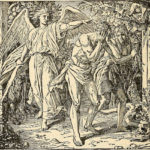We run our website the way we wished the whole internet worked: we provide high quality original content with no ads. We are funded solely by your direct support. Please consider supporting this project.

Coming Home
The only way we can experience the life God has for us is to give up trying to acquire it on our own. We must surrender ourselves completely to God. This is not merely a matter of believing that our attempts to acquire worth and significance (some of the ways that we do this were discussed in yesterday’s post) are idolatrous and unsatisfying. We can easily believe this and yet fail to relinquish our idols and surrender to God. We enter into the life of God only when our false gods have in fact been relinquished and only when God is in fact reigning over our life.
To the extent that our identity is rooted in what the New Testament calls the “flesh”—giving up our false gods will feel like a kind of death. In fact, it is a kind of death, for the “old self” that relies on idols to feel worthwhile and significant is being killed. This is why Jesus said that we must lose our life to find it (Matt 16:25).
Still, as scary and as difficult as dying to this false way of living may initially be, nothing could be more liberating. Living with perpetual hunger, spending most of our mental life in the past and future, chasing after pathetic false gods, is complete bondage. When we cling to things that we know we will eventually lose, we inevitably find ourselves in a state of worry, anger, jealousy, envy, frustration, strife, violence, and despair—things Paul referred to as the “works of the flesh” (Gal 5:19). To die to the flesh is the greatest liberation possible.
As we are freed from the grand illusion that we can meet our own needs, our built-in homing device begins to work correctly. We’re on our way home. And we don’t have to strive to find it. On the contrary, the instant we relinquish the world of idols and turn to God, he is there. In him we live and move and have our being (Acts 17:28). There is nowhere we can run and hide from his presence (Ps 139:8).
The moment we surrender, we are home. In fact, the moment we stop chasing and clinging we discover that we never really left home. Like Dorothy in The Wizard of Oz, we wake up from a dream and discover that all we’ve been looking for surrounds us at every moment. When we stop looking at the world as though God is not with us and we have to make it on our own, we find we are surrounded each and every moment with a love that infuses our life with a value that couldn’t possibly be improved on.
Coming home is simply waking up from the illusion that you aren’t already there.
—Adapted from Present Perfect, pages 52-54
Photo credit: Eugene Quek via Unsplash
Category: General
Tags: Idolatry, Kingdom Living, Practicing the Presence of God
Related Reading

What is “Original Sin”?
I get asked about “original sin” quite a bit. Are people born guilty? Many times questions like this originate from folks who are worried about whether babies who die without being baptized go to hell. This is what I was taught as a young Catholic boy, and I have to confess I now find the…

Our Beautiful, Nightmarish World
The Bible consistently proclaims that the creation reflects the glory of God. To me, the truth of this proclamation is undeniable. When I was younger I several times went on three-week solo backpacking trips into the mountainous forests of Montana. If gazing at the star studded sky on a moonless night at the peak of…

homosexuality, truth telling, and love
A Guy Taking Pictures via Compfight A couple weeks ago, we posted a portion of Greg’s sermon (and his comments) on the marriage amendment in Minnesota, homosexuality and finding a “Third Way”. Today we’re continuing the conversation by linking to a blog post by Sarah Bessey called In which I tell you the truth about…

The Trap of Religious Idolatry
We live in a world that seems to be full of religious idols. These are beliefs, rituals, and behaviors from which religious people draw life. Religious idolaters of course don’t recognize their idols as such. However, we can try to get “life” from believing the “right” things and acting the “right” way in the same…

Did Jesus Instruct Us to Arm Ourselves?
Over the past few posts, I’ve been dealing with the passages that are frequently used to argue how Jesus condoned violence. One of these takes place just after the last supper and just before Jesus and his disciples were going to travel to the Mount of Olives to pray. To prepare his disciples, Jesus tells them;…

A Kingdom Not of This World
Bruxy Cavey spoke at Woodland Hills Church back in May as a part of the Tapestry series, and this is a little snippet of his sermon. It’s a wonderful description of the Anabaptist approach to politics. Take a look!
